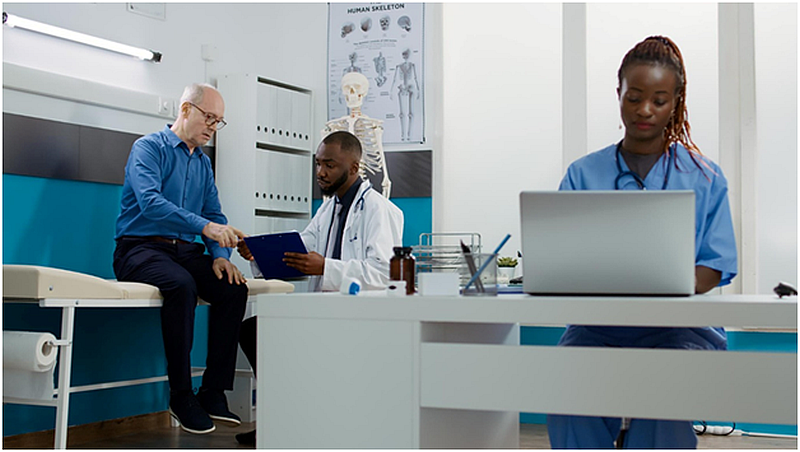Elevating experiences at GP surgeries goes beyond just addressing physical ailments and includes a holistic approach to healthcare. Imagine if your GP went beyond treating your physical symptoms and enhanced your overall well-being. This article explores how prioritising well-being in GP practices transforms patient healthcare journeys. Discover the strategies that make every GP visit more focused on patient health and wellness.
Understanding the Importance of Well-being in GP Practices
To promote patient-oriented care, well-being is essential in General Practitioner (GP) practices. Prioritising patient well-being increases their outcomes by including physical and mental health factors. The inclusion of mental and physical health makes this all-inclusive approach very important. A patient’s mental condition has a big impact on the recovery of their physical health.
GPs who pay attention to patient well-being will more likely notice underlying health problems and start necessary treatments. A GP who sees signs of stress or anxiety can give lifestyle advice to their patient. They can also send patients to specialists if necessary. This can prevent possible long-term effects on patients’ mental and physical health.
Focussing on patient well-being means more satisfied patients with increased trust in GPs, leading to more effective treatment. Using innovative utility solutions for GP surgeries enhances this approach more. It creates a supportive environment that encourages better communication and patient involvement. Health outcomes are better because care standards are raised, and GPs have better patient relationships.
The Role of General Practitioners in Promoting Patient Well-being
When GPs focus on their patient’s mental and physical health, they can identify and treat latent health problems more effectively. A patient suffering from chronic pain could also have depression, which can be uncovered and treated with this all-encompassing approach. Healthcare experiences can be more satisfactory and effective when practices assess overall patient health. GPs can increase patient well-being by:
- Conducting Comprehensive Assessments. Besides physical exams, GPs must discuss patient lifestyles, social factors, and mental health.
- Offering Personalised Care Plans. Advice and treatments must be unique to patient circumstances and health requirements.
- Promoting Preventative Healthcare. Advise about lifestyle changes and other preventative measures to maintain long-term health.
Creating a Comforting Environment: The First Step to Well-being
A welcoming GP surgery environment will considerably lower patient stress, improving their overall experience and well-being. The atmosphere of a medical facility plays an important part in the comfort and perception of patients. A brightly lit GP office with lots of natural light instantly lifts moods and create lit GP office with lots of natural light instantly lifts moods and creates a sense of warmth.
Introducing plants, soothing colours, and comfortable chairs significantly lower stress levels. Patients feel calmer and more confident when the clean space is organised with positive health-related visuals on display. While soft background music or soundproofing creates a calm atmosphere, it also lowers noise pollution.
Creating a comforting environment also benefits employees’ well-being, boosting the quality of patient care and interactions. Look at your GP surgery from a patient’s perspective to identify ways to make the space more comforting.
Effective Communication: Building Trust and Understanding
Effective communication is crucial for a successful GP-patient relationship. Clear and empathetic communication helps to promote trust and understanding between GPs and patients, leading to better patient well-being. Patients who feel heard and valued disclose more information to GPs, leading to more accurate diagnoses and customised treatments.
Clear communication lowers patient anxiety and improves compliance with GP advice. Patients of GPs who communicate better tend to stick more to treatment plans. It also gets rid of misunderstandings between GPs and patients. Patients are more inclined to talk about sensitive health issues to empathetic GPs in supportive environments.
GPs must actively listen to patient concerns and repeat them for clarity. Everything must be explained clearly in a way that the patient understands. This must be done with empathy, meaning GPs must acknowledge and show real concern for patients’ feelings. Get regular patient feedback on communication so that GP strategies can be improved.
Incorporating Mental Health Support in GP Services
GPs must include mental health support to ensure comprehensive patient care. Patients facing mental health problems tend to contact GPs first. Therefore, GPs must have the proper resources and knowledge to give the necessary support. GP staff must receive regular mental health training to recognise symptoms and provide initial support.
GPs must accept and confront mental health as an integral part of a patient’s overall well-being. GPs must use screening tools for early detection of mental health problems and refer patients to necessary specialised care. Having a GP surgery with a comforting and impartial environment can prompt patients to talk about mental health concerns. This approach improves patient outcomes and lowers the long-term strain on healthcare systems.
Lifestyle Advice: Beyond Prescription

GPs don’t always have to enhance patient well-being with prescriptions and medication. By giving lifestyle advice, they can encourage important changes to improve patients’ well-being. This all-encompassing approach treats the fundamental causes of health problems to increase long-term wellness.
Lifestyle factors, like exercise, diet, and stress management, drastically impact health. GPs know enough about their patients to give specialised advice based on individual needs. This proactive approach encourages patients to change to healthier lifestyles and prevent future health problems.
GPs can give dietary guidance by recommending balanced diets that take patients’ conditions like diabetes and hypertension into consideration. They can create exercise plans to encourage physical well-being and respect fitness levels, age, and medical history. GPs can encourage the use of stress reduction techniques to increase mental health. They can refer patients to counselling services if necessary.
The Power of Patient Education and Resources
GPs must educate patients on their health and the available resources. More informed patients are more active in their healthcare and have better health outcomes. GPs must ensure that information about common ailments and treatments is accessible to lower patient anxiety regarding them.
There are several ways that GPs can integrate patient education. Simplify medical information using clear, understandable, and jargon-free language in brochures and digital platforms. Personalised care plans must contain information about patient needs, emphasising relevant lifestyle changes and preventative measures. GPs must recommend digital tools like trustworthy websites and apps for more information.
Leveraging Technology for Enhanced Patient Experience
Modern technology in GP surgeries enhances patient experiences and can dramatically increase health outcomes and patient well-being. Digital tools include online appointment systems that improve scheduling, reduce waiting times, and lessen administrative duties. Telemedicine provides remote consultations that benefit patients with mobility problems and limited time. It also helps patients who live in remote and underserved areas.
Electronic Health Records (EHRs) let GP surgeries manage patient data accurately and efficiently, providing better health monitoring and personalised care. This system has portals where patients can access their health information. Having all patient information in one place allows GPs to create more accurate and efficient treatment plans. Together with better patient engagement, it enhances patient satisfaction and care standards.
Patient Feedback: Listening and Adapting for Better Care
Patient feedback helps GP surgeries evaluate and improve patient care. GPs who actively listen to patient concerns and experiences promote patient-friendly environments. This also helps them to determine where practices can be improved. Patients are more likely to participate in their health journeys when they feel heard, which leads to improved health outcomes.
Get patient feedback about service efficiency, communication effectiveness, and overall patient experience. Regular feedback systems include surveys and suggestion boxes, which allow patients to give their opinions. This feedback will give GPs tips on improving their offices and services.
GP surgeries must respond to all the feedback they receive. This could include using new, more accessible appointment systems or waiting rooms that are more welcoming and comfortable. Overall, healthcare experiences are improved when GPs are committed to continuously improving their offices and services based on patient feedback.
Collaboration with Other Healthcare Providers
Multidisciplinary collaboration between GPs and specialising doctors makes patient care more effective. Having an entire network of healthcare specialists increases the quality of patient treatment. This holistic approach to health issues ensures that symptoms and their causes are treated.
GPs and specialists must constantly communicate and share their health management plans. Patient care is more effective and efficient with a system for referrals and feedback between different healthcare professionals. Healthcare standards and patient experience are improved with this approach. It leads to improved health outcomes.
Conclusion
Patient health outcomes and overall healthcare experience can be improved by prioritising wellness in GP surgeries. This can be done through holistic patient care, effective communication, comforting environments, and multidisciplinary collaboration.
GPs can visit https://exhealth.drprem.com/ to get tips on making their surgeries more focussed on patient wellbeing.
Article Submitted By Community Writer




